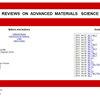钛石膏中的杂质成分对石膏-矿渣胶凝材料凝结时间和力学性能的影响
IF 3.6
4区 材料科学
Q2 MATERIALS SCIENCE, MULTIDISCIPLINARY
引用次数: 0
摘要
使用钛石膏代替石膏作为制备石膏-矿渣胶凝材料(GSCM)的原料,可以降低成本,提高固体废弃物的利用率。然而,钛石膏中含有 Fe2O3、MgO 和 TiO2 等杂质,使其对 GSCM 性能的影响不确定。为了研究这个问题,本研究制备了掺入不同比例 Fe2O3、MgO 和 TiO2 的 GSCM,并测试了 GSCM 在 3 天、7 天和 28 天的凝结时间和强度。还通过扫描电子显微镜、能谱分析、X 射线衍射分析和热重分析研究了不同氧化物对 GSCM 性能的影响。实验结果表明,Fe2O3、MgO 和 TiO2 对 GSCM 都有一定的促凝作用,对强度有轻微影响。通过显微分析发现,GSCM 的主要水化产物是 AFt 相和钙铝硅酸盐水合物(C-(A)-S-H)凝胶。加入 Fe2O3 后可观察到富含铁的 C-(A)-S-H 凝胶,加入 MgO 后可观察到 Mg(OH)2 和 M-S-H 凝胶。添加 TiO2 并未导致 GSCM 产生新的水合产物。本文章由计算机程序翻译,如有差异,请以英文原文为准。
Effect of impurity components in titanium gypsum on the setting time and mechanical properties of gypsum-slag cementitious materials
The use of titanium gypsum instead of gypsum as a raw material for the preparation of gypsum-slag cementitious materials (GSCM) can reduce the cost and improve the utilization of solid waste. However, titanium gypsum contains impurities such as Fe2 O3 , MgO, and TiO2 , which make its effect on the performance of GSCM uncertain. To investigate this issue, GSCM doped with different ratios of Fe2 O3 , MgO, and TiO2 were prepared in this study, the setting time and the strength of GSCM at 3, 7, and 28 days were tested. The effects of different oxides on the performance of GSCM were also investigated by scanning electron microscopy, energy spectrum analysis, X-ray diffraction analysis, and thermogravimetric analysis. The experimental results showed that Fe2 O3 , MgO, and TiO2 all had a certain procoagulant effect on GSCM and a slight effect on the strength. Through micro-analysis, it was found that the main hydration products of GSCM were AFt phase and calcium–alumina–silicate–hydrate (C–(A)–S–H) gels. Fe-rich C–(A)–S–H gels were observed with the addition of Fe2 O3 , and Mg(OH)2 and M–S–H gels were observed with the addition of MgO. The addition of TiO2 did not result in new hydration products from GSCM.
求助全文
通过发布文献求助,成功后即可免费获取论文全文。
去求助
来源期刊

Reviews on Advanced Materials Science
工程技术-材料科学:综合
CiteScore
5.10
自引率
11.10%
发文量
43
审稿时长
3.5 months
期刊介绍:
Reviews on Advanced Materials Science is a fully peer-reviewed, open access, electronic journal that publishes significant, original and relevant works in the area of theoretical and experimental studies of advanced materials. The journal provides the readers with free, instant, and permanent access to all content worldwide; and the authors with extensive promotion of published articles, long-time preservation, language-correction services, no space constraints and immediate publication.
Reviews on Advanced Materials Science is listed inter alia by Clarivate Analytics (formerly Thomson Reuters) - Current Contents/Physical, Chemical, and Earth Sciences (CC/PC&ES), JCR and SCIE. Our standard policy requires each paper to be reviewed by at least two Referees and the peer-review process is single-blind.
 求助内容:
求助内容: 应助结果提醒方式:
应助结果提醒方式:


